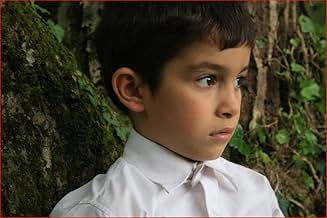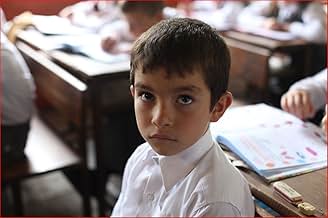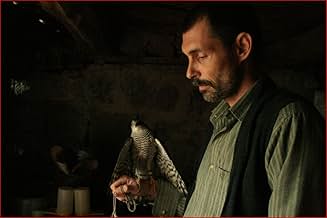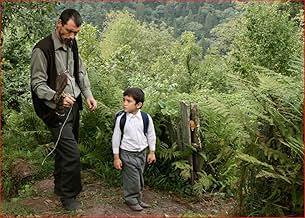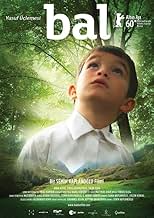AVALIAÇÃO DA IMDb
7,1/10
7,7 mil
SUA AVALIAÇÃO
Adicionar um enredo no seu idiomaThe quiet life of a boy and his family is endangered when his father does not return home from his work collecting honey in the forest.The quiet life of a boy and his family is endangered when his father does not return home from his work collecting honey in the forest.The quiet life of a boy and his family is endangered when his father does not return home from his work collecting honey in the forest.
- Direção
- Roteiristas
- Artistas
- Prêmios
- 14 vitórias e 15 indicações no total
- Direção
- Roteiristas
- Elenco e equipe completos
- Produção, bilheteria e muito mais no IMDbPro
Avaliações em destaque
Film 4 champions movies that most viewers would never otherwise have the opportunity to enjoy, let alone even know about. Therefore, they are to be congratulated and supported for showing minor gems such as 'Honey' (Bal).
A small number of films have been applauded for stripping down both pace and cinematic frills to convey a way of life. Literally, any slower and we'd be in real time! Italy's 'A Tree of Wooden Clogs' is a famous example which understandably divides opinion quite severely.
It is almost incidental as to whom, what, and where 'Bal' is set and about. It will obviously appeal to those who prefer the organic side to things in life, whether in nature, lifestyle or in the cinematic process. Bal covers all these to a generous degree.
Yes, it features throughout a six year old stammering Turkish schoolboy - Yusuf - not particularly photogenic, or cute, or naughty, or anything. Just an everyday kid who has a bee-keeping father, who doesn't actually keep bees. Well, not in any one place - he places the hides in remote and beautiful areas and then extracts the honey. His quite young (looking) dutiful mother picks tea.
I feel quite privileged to have been given a beautifully, often exquisitely, photographed study of this life and taking up just two hours of my own life. I learned much and there is a quiet story in there somewhere - you can make of it what you will, it's almost unimportant. Or is it?
I turned my hi-fi amplifier up quite high when playing the film's sound through it and would strongly suggest you do similar. The all- encompassing natural sounds are so well recorded, every nuance and snippet of sound help paint a very vivid sonic picture. You could almost close one's eyes and listen to this on its own. Almost uniquely, (and thankfully) you won't have to suffer a sudden booming beat or great crescendo of added noise to make you jump out of your skin. It would sound great with headphones, too, I'm sure (as long as you have a stereo source, of course).
Personally, I always find it comforting when a film, involving a child features a good teacher. We all know and recognise one, from our own childhoods - Yusuf's teacher is measured and fair, calm and patient, rewarding good work, dissuading bad. These scenes were an absolute pleasure.
Apparently, this is the final part in a trio of films by Turkish writer/director Semih Kaplanoglu, though chronologically, it is the first part. Naturally, now, I want to see the other two parts, 'Egg' and 'Milk'. I'm hoping that Film 4 will be showing these, too, at some point.
A small number of films have been applauded for stripping down both pace and cinematic frills to convey a way of life. Literally, any slower and we'd be in real time! Italy's 'A Tree of Wooden Clogs' is a famous example which understandably divides opinion quite severely.
It is almost incidental as to whom, what, and where 'Bal' is set and about. It will obviously appeal to those who prefer the organic side to things in life, whether in nature, lifestyle or in the cinematic process. Bal covers all these to a generous degree.
Yes, it features throughout a six year old stammering Turkish schoolboy - Yusuf - not particularly photogenic, or cute, or naughty, or anything. Just an everyday kid who has a bee-keeping father, who doesn't actually keep bees. Well, not in any one place - he places the hides in remote and beautiful areas and then extracts the honey. His quite young (looking) dutiful mother picks tea.
I feel quite privileged to have been given a beautifully, often exquisitely, photographed study of this life and taking up just two hours of my own life. I learned much and there is a quiet story in there somewhere - you can make of it what you will, it's almost unimportant. Or is it?
I turned my hi-fi amplifier up quite high when playing the film's sound through it and would strongly suggest you do similar. The all- encompassing natural sounds are so well recorded, every nuance and snippet of sound help paint a very vivid sonic picture. You could almost close one's eyes and listen to this on its own. Almost uniquely, (and thankfully) you won't have to suffer a sudden booming beat or great crescendo of added noise to make you jump out of your skin. It would sound great with headphones, too, I'm sure (as long as you have a stereo source, of course).
Personally, I always find it comforting when a film, involving a child features a good teacher. We all know and recognise one, from our own childhoods - Yusuf's teacher is measured and fair, calm and patient, rewarding good work, dissuading bad. These scenes were an absolute pleasure.
Apparently, this is the final part in a trio of films by Turkish writer/director Semih Kaplanoglu, though chronologically, it is the first part. Naturally, now, I want to see the other two parts, 'Egg' and 'Milk'. I'm hoping that Film 4 will be showing these, too, at some point.
From time to time you encounter a movie that's excellent, but somehow doesn't get to you the way it should. This one's such a movie.
So much is done the right way: the calm narrative style and some wonderfully photographed scenes deepen the already atmospheric location work; the actors are convincing; and there's no need for cheap plot twists and conclusions.
But something's missing, maybe some sort of magic realism that would transcend the simple story into a meatier concoction.
I liked it, but I didn't love it.
7 out of 10 humiliating book-readings
So much is done the right way: the calm narrative style and some wonderfully photographed scenes deepen the already atmospheric location work; the actors are convincing; and there's no need for cheap plot twists and conclusions.
But something's missing, maybe some sort of magic realism that would transcend the simple story into a meatier concoction.
I liked it, but I didn't love it.
7 out of 10 humiliating book-readings
The slow pace of Bal works to great affect as it explores the tribulations of a young boy not only with the conventional use of a storyline narrative but also with a range of beautiful compositions which equals the sophisticated style of vivid portraits.
Yusuf is a young boy who is an outsider yet vastly intelligent. He is at odds with his school life never fitting in amongst his peers, constantly watching them from a distance along with struggling in parts of his studies. When Yusuf stutters through a reading in class minimal techniques are used, only the camera slowly tracking towards Yusuf and multiple POV shots of school peers focusing on Yusuf in awkward silence contain the scenes vibe yet it strikes such an impact emotionally feeling Yusuf's embarrassment. Whereas watching Yusuf with his Father in a simple static shot as they work and explore in the local woodlands shows his deep connection with nature by knowing the names and mannerisms of various plants, it is wonderful to witness the bond the pair have and to feel Yusuf's tranquillity. The techniques used to capture these moments are simple yet effective showing the brilliance of Bal.
Bal contains strong visual elements not only in the minimal techniques used to capture Yusuf's story but in the compositions which are styled with outstanding detail. Yusuf sat alone in a barn facing the camera in mostly dark lighting to inhabit his depressing mood before the head of his Father's donkey appears from behind Yusuf to provide comic relief convey his mood in the same manner a later dream sequence. After his Father goes missing Yusuf begins to have haunting dreams, one of which is himself stood alone in the forest with the visuals being one of a greyish palette before dead bees drop into his hand as a foreboding of his Father's death.
In a way it is hard to describe Bal as a film because its much more. Bal is a piece of visual art that transcends from its quiet storyline to present the atmosphere and emotions embedded in Yusuf's life as well as those around him with striking use of compositions and ingenuity. Bal is not a viewing experience for everyone, only those who appreciate the visual sophistication celluloid can offer will be moved by this film.
Yusuf is a young boy who is an outsider yet vastly intelligent. He is at odds with his school life never fitting in amongst his peers, constantly watching them from a distance along with struggling in parts of his studies. When Yusuf stutters through a reading in class minimal techniques are used, only the camera slowly tracking towards Yusuf and multiple POV shots of school peers focusing on Yusuf in awkward silence contain the scenes vibe yet it strikes such an impact emotionally feeling Yusuf's embarrassment. Whereas watching Yusuf with his Father in a simple static shot as they work and explore in the local woodlands shows his deep connection with nature by knowing the names and mannerisms of various plants, it is wonderful to witness the bond the pair have and to feel Yusuf's tranquillity. The techniques used to capture these moments are simple yet effective showing the brilliance of Bal.
Bal contains strong visual elements not only in the minimal techniques used to capture Yusuf's story but in the compositions which are styled with outstanding detail. Yusuf sat alone in a barn facing the camera in mostly dark lighting to inhabit his depressing mood before the head of his Father's donkey appears from behind Yusuf to provide comic relief convey his mood in the same manner a later dream sequence. After his Father goes missing Yusuf begins to have haunting dreams, one of which is himself stood alone in the forest with the visuals being one of a greyish palette before dead bees drop into his hand as a foreboding of his Father's death.
In a way it is hard to describe Bal as a film because its much more. Bal is a piece of visual art that transcends from its quiet storyline to present the atmosphere and emotions embedded in Yusuf's life as well as those around him with striking use of compositions and ingenuity. Bal is not a viewing experience for everyone, only those who appreciate the visual sophistication celluloid can offer will be moved by this film.
it is tempting to define it as art film. or as poem about life. or as masterpiece. in fact, it is only a story. a story like many others from the old times. a family. a boy. memories. and the absence. all is well known. the film is only support for remind. and each scene becomes a trip in yourself. a circle around basic truths. rediscover of the purpose of cinema. this is all. a family. a boy. the father. and the forest. like a line. letters and signs and the voice of teller. parts of reflection of world in yourself.
beauty is the basic virtue of film. the beauty of images, the crumbs of mystery, Bora Altas are parts of this delicate, light-dark movie.a slice of pure life. that is all. and the delicate art of director to create the thirt part of a trilogy. seductive Turkish film, it is mixture of different lines of common life, religion and forms of poetry, small gestures and childhood perceptions. embroidery of signs and looks,it can have a lot of keys. but fundamental thing, the secret of this fragile construction, reflection about essential ingredients of life remains this special beauty. but it is not the unique source of fascination. because it is a correct story and each viewer has chance to discover his well known part. the school, the relation with the father, the image of mother, the wood, the different feelings, the search, the sleep and the shadows from little Heaven are drops who can make Honey a real good movie.
Você sabia?
- CuriosidadesThe poem that a female student reads aloud and which Yusuf listens to is a Turkish translation of Arthur Rimbaud's "Sensation."
Principais escolhas
Faça login para avaliar e ver a lista de recomendações personalizadas
- How long is Honey?Fornecido pela Alexa
Detalhes
Bilheteria
- Orçamento
- € 1.250.000 (estimativa)
- Faturamento bruto mundial
- US$ 1.381.730
- Tempo de duração1 hora 43 minutos
- Cor
- Mixagem de som
- Proporção
- 1.85 : 1
Contribua para esta página
Sugerir uma alteração ou adicionar conteúdo ausente

Principal brecha
By what name was Um Doce Olhar (2010) officially released in Canada in English?
Responda
![Assistir a Trailer [OVS]](https://m.media-amazon.com/images/M/MV5BMjkyOGM4YzMtYWY3ZS00NTkzLWJmOWYtNzQ2MzEzYzg2MDc2XkEyXkFqcGdeQXRyYW5zY29kZS13b3JrZmxvdw@@._V1_QL75_UX500_CR0)
